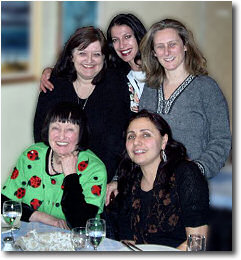
Sheila Jordan, Eleonora D'Ettole,
Nadia Pazzaglia, Eva Simontacchi, Patrizia Sonego
Sheila Jeanette Dawson was born on 18 november
1928, in Detroit, Michigan. Raised in poverty in Pennsylvania's coal-mining country, Sheila Jordan began singing as a child, and by the time she was in her teens, she was working semi-professionally in Detroit clubs. Her first great influence was Charlie Parker, and indeed, most of her influences have been instrumentalists rather than singers. Working mainly with black musicians, she met with disapproval from the white community but persisted with her career. She was a member of a vocal trio,
Skeeter, Mitch and Jean (she was Jean), who sang versions of Charlie Parker's solos in a manner akin to that of the later Lambert, Hendricks and Ross. After moving to New York in the early
50s, she married Parker's pianist,
Duke Jordan, and studied with Lennie Tristano, but it was not until the early 60s that she made her first recordings. One of these was under her own name, the other was "The Outer View" with
George Russell, which featured a famous 10-minute version of "You Are My Sunshine".
In the mid-60s her work encompassed jazz liturgies sung in churches and extensive club work, but her appeal was narrow even within the confines of jazz. By the late
70s jazz audiences had begun to understand her uncompromising style a little more and her popularity increased – as did her appearances on record, which included albums with pianist Steve Kuhn, whose quartet she joined, and an album, Home, comprising a selection of
Robert Creeley's poems set to music and arranged by Steve Swallow.
A 1983 duo set with bassist Harvie Swartz, "Old Time Feeling", comprises several of the standards
Sheila Jordan regularly features in her live repertoire, while 1990's "Lost And Found" pays tribute to her bebop roots. Both sets display her unique musical trademarks, such as the frequent and unexpected sweeping changes of pitch which still tend to confound an uninitiated audience. Entirely non-derivative, Sheila Jordan is one of only a tiny handful of jazz singers who fully deserve the appellation and for whom no other term will do. The singer recently celebrated her seventy-fith birthday by releasing "Little Song" on Highnote Records.
..::A dinner with Sheila Jordan::..
Sheila Jordan has been working all day, studio, sound check… and here she is, as fresh and smiling as can be. She is blessed with an incredible vitality and vigour, and is a girl among her girls – some of the Italian pupils that have been following her courses here in Italy for years –
Eleonora D'Ettole,
Nadia Pazzaglia,
Patrizia Sonego. We have a nice dinner together, and while we are waiting for our coffees and desserts, we start asking her questions….
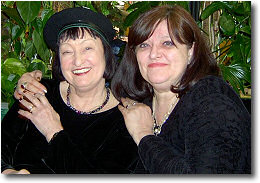 Nadia Pazzaglia:
We would like to know, in all these years of career and experience, have you ever felt you weren't being appreciated in your profound value and uniqueness by those around you, or did you pass moments in which you were less inspired, and how did you overcome them?
S.J.: Yes, I had a lot of moments like that in my life, where I wasn't working as much as I wanted to, or maybe I wouldn't work at all for a long, long time. But I always knew that if I kept doing the music, in my heart, whether I was working out somewhere in front of people or just keeping it within my heart, I would sing again somewhere and somehow. So it's not to lose the need to do the music. That is the dedication part of it. Dedication has to do with keeping the music alive regardless of what happens, whether you can sing it all the time, or you cannot sing all the time, but it's just the dedication of keeping it going. And you have to be very careful, because at one point in my life that led me to alcohol and drugs. I found that as a crutch to use when I wasn't working the way I wanted to, because of the need, not because of the money. Because of the need to do the music, and music is like food for me, which I'm sure it is for a lot of people who are totally immersed and involved in the music. And when you don't have the food, the spiritual food, there's a part of you that is unfulfilled…. So a lot of times you have to be very careful because you can get into alcohol and drugs because of that.
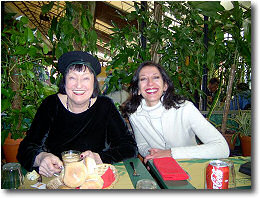 Eva Simontacchi:
It's a sort of depression that comes over you, and you start doing things that are not good for you… Eva Simontacchi:
It's a sort of depression that comes over you, and you start doing things that are not good for you…
S.J.:
Absolutely! Destroying yourself! And in all probability destroying the one thing that you love the most which is the music. So I found through help and through belief and through programs that help people with alcohol and drug addictions, a way to believe in myself and in the fact that this would happen again… I've been very lucky, ‘cause I prayed a lot, and I tried to be with people who were very instrumental in helping me through these crises in my life when thay came up.
E.S.:
So, in a way, these crises that you went through, and all the difficulties… They made you stronger.
S.J.:
Yes.. They're in the music! It's all part of the music, and good or bad, it's in the music. It's all experience and it's all in the music.
Eleonora D'Ettole:
Nadia asked you about the difficult parts of your life. I would like to ask you about the greatest joys you ever experienced in your life. Which are the things that gave you the strength and the hope to go on… The good ones…
S.J.:
You mean hearing the music or actually singing it? What are you talking about?
E.D.:
Things that helped you a lot, which gave you positiveness and energy to go ahead.
S.J.:
Oh, well… People who understood what I was trying to do musically..Any time that somebody came up, not that I need to have compliments, but somebody that would come up and talk to me and say that they really heard what I was doing and really felt what I was doing… Ah! That gave me confidence!
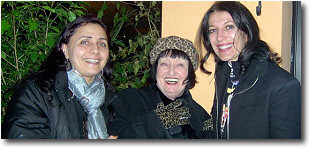 When I was a kid
Charlie Parker was very strong in telling me that I had million dollar ears. He said: "You're gonna be all right, kid!" And then just the different musicians that have gotten me concerts and places to do the music. I don't have an agent, and I don't have a manager, so all of the jobs that I get are through the musicians, and that's a tremendous compliment for me, because they would call me up and ask me if I would do music with them. So these are great moments! Great moments in my life are when I'm singing with musicians and we're all connected. And we almost become one. I've had some out-of-body experiences in my life, through music. Not a lot, but yes, I've had out-of-body experiences. One of the first ones I ever had was doing the bass and voice. And that was hard to get into, because when I started doing bass and voice as a full concert, not a song, but as a whole evening of bass and voice, nobody was doing that. Nobody was even thinking about doing bass and voice. So therefore everybody said "What, are you crazy? Where's the drummer? Where's the piano?", so on and so forth… And I would just say: "In my head, man! It's in my head! The piano and the drums are in my head!" (We all chuckle, and Sheila chuckles too). When I was a kid
Charlie Parker was very strong in telling me that I had million dollar ears. He said: "You're gonna be all right, kid!" And then just the different musicians that have gotten me concerts and places to do the music. I don't have an agent, and I don't have a manager, so all of the jobs that I get are through the musicians, and that's a tremendous compliment for me, because they would call me up and ask me if I would do music with them. So these are great moments! Great moments in my life are when I'm singing with musicians and we're all connected. And we almost become one. I've had some out-of-body experiences in my life, through music. Not a lot, but yes, I've had out-of-body experiences. One of the first ones I ever had was doing the bass and voice. And that was hard to get into, because when I started doing bass and voice as a full concert, not a song, but as a whole evening of bass and voice, nobody was doing that. Nobody was even thinking about doing bass and voice. So therefore everybody said "What, are you crazy? Where's the drummer? Where's the piano?", so on and so forth… And I would just say: "In my head, man! It's in my head! The piano and the drums are in my head!" (We all chuckle, and Sheila chuckles too).
I remember one time when the bass and
voice totally connected to the point that it became one sound, and I just
totally left my body. Totally left my body. Didn't remember who I was, where I
was, where the sounds were coming from, how it was happening, but it was the
most unbelievable feeling in the world! I can't even describe it. And I think
I've had about five of those in my life, so I'm very lucky… And you never know
when they're going to happen. You never know. They might not happen for twenty
years, and then you have one, and it's great! As far as musical moments, I've
had great moments with great musicians. I can't name any one particular time,
but usually, what I try to do is, in order not to feel uncomfortable or nervous
or wonder: 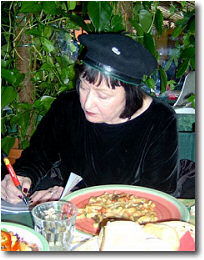 "Oh my God is everybody going to like me?", I don't go there with that… I just go with the fact that I love this music, it's important for me to carry the message. I feel like I'm a messenger. When I teach and when I sing, I'm a messenger of this music. And that's how I feel about myself, and so as long as I have that feeling I'm a messenger, and as I'm talking to you, and we're talking together, and you're telling me your things like these young singers tell me how they feel and I tell them how I feel, that to me is like a message, and that's what the music is when I'm doing it, when I'm performing. It's like a message.
"Oh my God is everybody going to like me?", I don't go there with that… I just go with the fact that I love this music, it's important for me to carry the message. I feel like I'm a messenger. When I teach and when I sing, I'm a messenger of this music. And that's how I feel about myself, and so as long as I have that feeling I'm a messenger, and as I'm talking to you, and we're talking together, and you're telling me your things like these young singers tell me how they feel and I tell them how I feel, that to me is like a message, and that's what the music is when I'm doing it, when I'm performing. It's like a message.
E.S.:
Sheila, what is beyond music? What is hidden behind it?
S.J.:
What do you mean?
E.S.:
What I really mean is: we're talking about music. But it isn't just notes and sound… What gives everything a meaning?
S.J.:
Your soul! Your soul! That's what it's always been for me! Forget about the notes! The notes are only a stepping stone to the soul!
E.S.:
Yes! You were saying it, but not straightforward…. I really wanted you to say it and talk about it….
S.J.:
Yes, it's the soul! I'm talking about emotion… In other words, what I'm saying is that everything that happens to you in your life, good or bad, if you're really connected to the music, if your soul is connected to the music and becomes part of your soul, or all your soul, then that's the story! Everything good or bad enters into that to become whatever this sound is or whatever this message is. I mean, my message is that no matter how down you get, or how much you're put down, or how hard it is for you to continue, because you don't have places to sing, you don't have respect all the time from other musicians, instrumentalists….
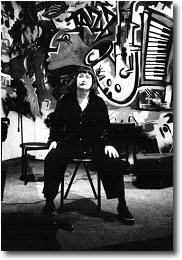 Do you believe it? Do you believe this gift you have, that you want to share with people? Do you believe it? Than you cannot let anybody put you down or keep you down. You have to rise above that. And that was very hard sometimes for me, but I never gave in. You know? Never gave in! And I used to have a lot of people say: "What do you wanna sing that music for? There's other music! You'll make a lot of money!" Do you believe it? Do you believe this gift you have, that you want to share with people? Do you believe it? Than you cannot let anybody put you down or keep you down. You have to rise above that. And that was very hard sometimes for me, but I never gave in. You know? Never gave in! And I used to have a lot of people say: "What do you wanna sing that music for? There's other music! You'll make a lot of money!"
I said: "Hey! It's not about the money… I can go get a job in an office, and type letters!" Which I did! It's not about that! I do that to support the music that I love, until the music that I love can support me! Maybe it will never support me, but I will always support it because I believe in it and I love it. Music for me is a way of life.
And I know the struggle young singers have, and my message to them is: "Don't let anybody, anything get you down. You will find a way to sing. There will be a way for you to express… Maybe not every day of the week, maybe not every day of the month, maybe once every couple of months, but you will find a place to do the music. And as long as you stick with it and don't leave it, and don't give up, and don't get discouraged, you'll be fine… And that's what I've done! You know, I mean, I've had to raise a child by myself. And I came from a very bad family. Very bad. I've been on my own since I've been seventeen years old supporting myself… I've been out there, I grew up very fast! I went through tremendous, tremendous racial prejudice from white people in Detroit when I was growing up because I wanted to be around the music, and the white cops would always take me down to the police station. I came to New York, I was beat up on the street for being with afroamericans… A lot of young people would have just said: "Oh! It's not worth it! I'm not gonna get killed over this music!" But to me it was worth it because if they're sick and prejudiced, and they're ugly because they don't want to see young white girls or young white people with black people, these were my friends! These were the only people that I could go to, that understood what I was trying to do, what I was looking for. It was that music, and it happened to be black music. It was bebop, it was
Charlie Parker, it was Thelonious Monk, Bud Powell, all the greats. So…. You could have given up if you weren't strong. The music was the most important thing in the world to me, and I said I would die for it. And I say that today: I would die for this music. It's a very beautiful way to express love and experience, this music. You can't do this with every music, but you can certainly do it with jazz. The prime examples of that were
Billie Holiday and Charlie Parker, and Bill Evans and all these great, great, great players who unfortunately got themselves very messed-up on alcohol and drugs, and you know, that's what we have to be careful of too! It's important that we don't go that route, because I've been that route, and it doesn't work. It does not work. It doesn't make you a better singer, it doesn't make you more relaxed, it does none of that at all. The only thing it does to you, is little by little bring you down to the point where you'll lose it. You see, I had a spiritual awakening about eighteen years ago. It was a voice… it wasn't like a voice that said "Hey…." It was like a "visual voice", you know what I mean? It happened organically, and the message was: "If you don't take care of the gift I've given you, then I'm gonna take it away from you and give it to somebody else who will respect it!" And that's when I decided I better not drink and drug any more. No matter how down I felt or how lost I felt at times because I wasn't singing the way I wanted to sing, and then I've been rewarded! Because, here I am, seventy-five years old, working more now than I ever worked in my life, and I am a living proof that it does work if you work at it. If you believe in it, and you keep it alive, it does work. I hope it doesn't take as long for others as it did for me, but even so, I'm just a living proof that just hanging in there, really works and it's worth it. And the girls know that… These singers (she encompasses Eleonora D'Ettole, Nadia Pazzaglia and Patrizia Sonego with a look) know that. They've been around me long enough and they've seen, and they know a lot about me. It's the only answer. It's the greatest music in the world, and if you get into it… But it's a dedication, and a dedication means also learning, never think you know at all. As I said, at my age I'm still learning. I learn all the time. Every time I open my mouth I learn…
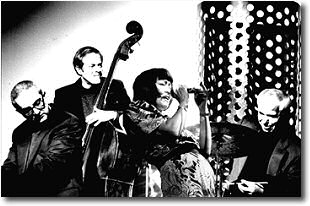 E.S.:
Since we're talking about learning… You're working on new projects, aren't you? New records? E.S.:
Since we're talking about learning… You're working on new projects, aren't you? New records?
S.J.:
Oh yes I'm going to get into the recording studio and make a recording with the
E.S.P. trio (Cipelli, Zanchi, Cazzola), and Paolo Fresu
on some of the songs. When they asked me to do it, I've been so busy, I'm happy to say, and I haven't really had time to research material. Because my record company wants me to do a record, but I want to do another bass and voice album… a live recording. So I haven't had time to research anything about….what do I want to record? I know all these songs, and a lot of them I recorded, and a lot of them I haven't, but I know that I'll have my own special sound and special way of doing these songs even if they're overdone, or a lot of people do them, or whatever… Then I thought: I always take time to find songs for singers when I teach them repertoire, different kinds of songs of different tempo, different approaches like feelings, so, some of the songs that I'm gonna do are some of the songs that I teach a singer, and that I never even thought of recording. But it hit me… I said: "Hey! Maybe I should record some of these songs because I really like them!" Because I would never give any of the singers that I teach songs that I would not sing myself. I don't do that. And I'm very honest. If they say: "Would you like this song? I've picked this song… Do you like it?" If I don't like it, I say "No, I don't like it". But that doesn't mean… you know, if you like it you should do it, if you really feel it.
I've always wanted to do a recording like really low-key like ballads, or just sort of like medium…. Not a lot of frantic scatting. Something like very light bossas, and ballads, and in between swing tempos and that's it…So that's what I'm gonna do. I'm just gonna go in there and sing like I'm singing for the singers…. (she smiles) This is my little tribute to singers all over the World who love the music and also some who I've taught, so it's kind of like a dedication to them. And that's what the project's about. And I'm also going to do a live bass and voice recording because there's a lot of bass and voice things I haven't recorded that I want to get on tape. I'm looking at it this way: as crazy as it sounds, I know my age…How many years do I have left? I mean, in actuality, and everybody goes "Oh, no! What do you mean, you can live….." Well no, I don't. No… I'm gonna turn around and I'll be eighty, you know, in the next few years. So some of the things that I want to leave are …. I don't want to go and record just to record. That doesn't mean anything to me. I've waited four years to do my last cd, for many reasons. I wasn't sure what I wanted to record, I didn't know who I wanted to record with exactly….
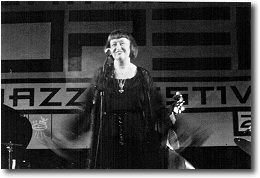 I knew that I wanted
Steve Kuhn if he was free and I was free, I knew that. I wasn't doing it because "I have to get a record out there, because otherwise I'll lose my popularity" and I don't care about that. I wanted it to be the right time, I wanted it to be… O.K. I'm ready to go in there, I think I've got something to say… on record. You know, I always have something to say in a performance, because you never know what's gonna happen, but on record, I'm not going to go in and record the same tunes over and over and over again, unless it's a live recording, then that's different. So, I don't record that much. Not because my record company doesn't want me to, they're always after me… But I just say: "I'm not ready yet… I have to think about it…" I take time, and all of a sudden it comes in, but in a certain sense I have to be careful, which a lot of us do, and that is not to procrastinate. It's very easy to get into that. Putting it off, putting it off… So that's what it's going to be… I don't know if the recording will go. We don't have a record company or anything…But they asked me if I would do it with them, and I felt very flattered! I said "Yeah! Of course I will!" So we're just gonna go in and do it and see what happens… It might not go anywhere, it might never go anywhere. But then again, maybe somebody will pick it up and it will turn out good. I have some wonderful musicians that are going to play on it, so we'll see. But again, that's second. Like young singers coming up today, if they can just think of the dedication and not so much about putting out a cd right away and… "Oh my God, what if I don't get any gigs?" "I better go get the gigs"… and that…you know… If they can take it easy and calm down and not stress over stuff like that… There's a lot of sessions. And you can set up your own things too, singers! They can get a club somewhere where they can have a night, where they can present singer's night once a month… That would be wonderful! If I were younger now, and not working as much as I'm working, I would definitely do that! I would make a club, my own club! I definitely would! I knew that I wanted
Steve Kuhn if he was free and I was free, I knew that. I wasn't doing it because "I have to get a record out there, because otherwise I'll lose my popularity" and I don't care about that. I wanted it to be the right time, I wanted it to be… O.K. I'm ready to go in there, I think I've got something to say… on record. You know, I always have something to say in a performance, because you never know what's gonna happen, but on record, I'm not going to go in and record the same tunes over and over and over again, unless it's a live recording, then that's different. So, I don't record that much. Not because my record company doesn't want me to, they're always after me… But I just say: "I'm not ready yet… I have to think about it…" I take time, and all of a sudden it comes in, but in a certain sense I have to be careful, which a lot of us do, and that is not to procrastinate. It's very easy to get into that. Putting it off, putting it off… So that's what it's going to be… I don't know if the recording will go. We don't have a record company or anything…But they asked me if I would do it with them, and I felt very flattered! I said "Yeah! Of course I will!" So we're just gonna go in and do it and see what happens… It might not go anywhere, it might never go anywhere. But then again, maybe somebody will pick it up and it will turn out good. I have some wonderful musicians that are going to play on it, so we'll see. But again, that's second. Like young singers coming up today, if they can just think of the dedication and not so much about putting out a cd right away and… "Oh my God, what if I don't get any gigs?" "I better go get the gigs"… and that…you know… If they can take it easy and calm down and not stress over stuff like that… There's a lot of sessions. And you can set up your own things too, singers! They can get a club somewhere where they can have a night, where they can present singer's night once a month… That would be wonderful! If I were younger now, and not working as much as I'm working, I would definitely do that! I would make a club, my own club! I definitely would!
You were all talking about reviewers before dinner, I think years ago when I got reviewed especially during that period in my life when I was down, a bad review could really affect me deeply… because I had a very low self-esteem to begin with because of life, a lot of different things, a lot of hard knocks… So a bad review could do that. Today if I get a bad review, I'm not saying it doesn't affect me. It bothers me if they don't understand what the music was about. I'm not bothered by it if they didn't like my sound… That doesn't bother me (she smiles)… That's fine! Because I don't have the kind of sound, in my opinion, that's that easily accepted, if you know what I mean. But when somebody doesn't understand the concept of what the music was about, and knocks the lyrics, or…. "they must have been drunk when they sang…." Listen, on my new CD I've got some wonderful reviews, but I got a one review where the guy had no clue, and I do this one song that I sang for my mother who died of alcoholism. And my grandmother and my mother both were drinkers, you know… alcoholics. And I sang this song for them called "When I Grow Too Old To Dream", it's an old song, and was a song that they used to sing when they got drunk… This guy, reviewed it and said: "She sounded like she was drunk when she sang it"….. You know what that does to a recovering alcoholic? (She laughs…) I wanted to kill him! I mean, he said if I wasn't trying, deliberately trying to sound drunk I was a genius. So, I guess I'm a genius, because I was not trying to sound drunk! Then I do this song by
Kenny Dorham, wonderful trumpet player who died young, he wrote this song called "Fair Weather".
Fair Weather is about racial equality, it's about people getting together and understanding one another one day. And this guy didn't get it. He said the lyrics were trite. And what was that supposed to mean, he couldn't understand…. Kenny Dorham….Ok, Buddy, you've been on the street in a racially prejudiced city like Detroit and parts of New York, where you've been beaten up because of it and where you've been harrassed by the police department because of your beliefs in racial equality, you know… So that's what's this song is about, that one day we'll all walk hand in hand and it will be fair weather. This guy didn't get it! He put that song down. He said I was a good scat singer. I don't think I'm a great scat singer… I think
Betty Carter is a great scat singer.
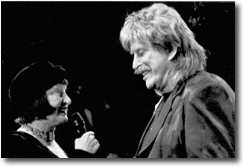 I think
Bobby McFerrin is a great scat singer, I think
Kurt Elling and
Mark Murphy are great scat singers. I don't think of myself as a great scat singer….He liked that but he couldn't get the fact that sometimes unless you have this beautiful pitched voice……. he couldn't get it. He didn't get it. I think
Bobby McFerrin is a great scat singer, I think
Kurt Elling and
Mark Murphy are great scat singers. I don't think of myself as a great scat singer….He liked that but he couldn't get the fact that sometimes unless you have this beautiful pitched voice……. he couldn't get it. He didn't get it.
But the point is, that years ago I would have drank. Or drugged over something like that. It would have led me right off the deep end, because he didn't understand what I was trying to convey; mostly because of the musicians who's compositions they were, and that I knew this was a true story. Never mind the voice being good or bad, but now all I'm shocked about is this guy can hear me scat, think I'm a wonderful scat singer and not hear me sing ballads that are a story. I don't sing songs that don't have depth. I don't! I don't sing songs that don't have a meaning. But I walk away and I laugh now. You have to get older… Did I write to him? Did I get drunk and call him up and tell him off? No! But years ago I would have… Now I sort of like say… "You know what? That's not my problem. That's his problem. And if he doesn't get it, it's too bad, because I don't expect everybody is going to like what we do." But like them (she points at her girls), people like them singing, any young singer like yourself, you have to be careful of that. And not let that break your spirit. You see, one thing about just teaching in general, is that the last thing in the World I want to do is break a young singer's spirit. And there's a lot of teachers and a lot of critics, and a lot of other musicians that do that. They break their spirit. And to me that's like commiting murder. It's like committing a spiritual murder (she underlines these words slapping her hand on the table).If I have to teach on a power trip, if I have to sing on a power trip, then I don't want to do it. It's not what I want to do. It's not where I'm coming from, I'm not there. That's not what it's about. And I find a lot of teachers are in competition with the singers that they teach. They're afraid they sing better than they do… Well, wouldn't you want them to be better? I mean, and not only that! Wouldn't you want them to learn from your mistakes and to go on and let them know that this is what you're going to get into but it's O.K. if you will overcome it? Wouldn't you give them that encouragement and that build-up so they know? But a lot of teachers don't do that. They shouldn't teach! When you destroy spirits, you shouldn't teach! And who's to say "better"? What does that mean? What does "better" mean? Better? We all have our own story to tell. Some people's voices are stronger or more resonant… That doesn't mean better necessarily…

New York, 22nd january 2004 - Panel
Jazz Vocal Coalition
Kurt Elling, Kitty Margolis, Sheila Jordan, Jay Clayton, Mark Murphy, Jon
Hendricks
E.S.:
You know what I tell the singers I teach? I know that there might be a little only too human envy that could come out, or somebody might feel frustrated by a stronger or powerful or resonant voice…So this is what I say: I love bouquets of colorful flowers. I love flowers to differ in my bouquet, so there's going to be all kinds of flowers, of different sizes, different colors, different smells, and that to me is a wonderful bouquet. Each flower enhances the other flowers next to it… And that's the same with voices! Every voice has its uniqueness, and each one of you should learn to appreciate and work on your uniqueness…
S.J.:
But you know, there's not enough of that out there today! I mean there's not enough teachers out there agreeing. And I'm always in shock when I have kids like Patrizia and Eleonora and Nadia, you know all the different singers in places that I go… And in Venice I have Paola who always comes back and says: "Oh, we want you to do a workshop" because I don't even think in terms of: "Is it good?" or "Are they learning anything?" or…. I don't know! But obviously they're getting something out of it because they keep having me back, and they stay friends with me. So I don't know what it is, and you know what? I don't question it any more.
E.S.:
Well, I think you are demonstrating it right now what it is. It's how honest you are inside. That's why they want you back, you're a rare person.
Now Giovanni wanted to ask you a question:
Giovanni:
The relationship between music and politics… Is there some kind of difference between one political wing and the other as far as art and music are concerned?
E.S.:
Are art and music helped and favoured by a political wing in the U.S.A.?
S.J.:
Yes, most of the left wingers….
E.S.:
And others don't?
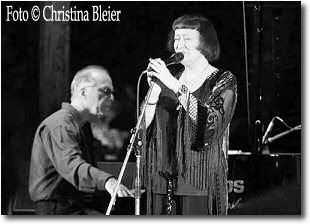 S.J.:
It's not that they don't… Some of them do. There are the right wingers who hear the music too, but most of the people who are into their form of art like the very abstract and creative writers and artists…. People who don't make a lot of money…. And the jazz. True jazz. I'm not talking about crossover or commercial… I'm talking about true jazz musicians who are not accepted, who are not really accepted by a party of certain people. The people usually who don't accept them are the very wealthy. (She smiles…) If they hire a jazz pianist trio for a party, they're not going to listen. They just want background music, and there's a lot of musicians who do that. I just did a gig before I came here with
Steve Kuhn, this wonderful piano player, and we did a duo gig together, and we worket at the Harvard Club…The guy that put it on, the guy that hired us, said: "Oh! I'm glad you're here! We've heard so much about you!" and so on… And I said "Really?" Well you know they gave me a certificate from Harvard because I went up there to Harvard University and I did a workshop… and I sang up there at a concert, and the Head, the President of Harvard University had sent me this certificate framed with a red ribbon around it! And I said "Gee! We must be starting to be accepted!" So he got up in front of all these people and said that. And the people that were there were very…. middle-aged or…. my age! (she laughs). And middle-aged and older, most of them were very up-tight…. But at the end, I said "You know what? I'm just gonna do what I do. They're not going to get to me, not at this age…I don't care." I did what I did and afterwards they were wonderful! They gave me a standing ovation! I was shocked. I said "You know what? I'm shocked because usually it's the other type of people who dig what I do!" So, in general I would say no, most of the free music, the avant-garde music, jazz music, the painers who are avant-garde into the free are not accepted. They are only accepted by the poor. When the democratic party gets in, I don't mean to get into politics, but usually all of the funding for the arts, when the republicans get in, it's taken away. And then when the democrats get back in again like your
John F. Kennedy, your Clinton and your Carter, they bring all of the arts back in again. Well, I'm just saying that to some people in America jazz is a dirty work. They think of drugs, alcohol, a lot of lovers, you know… There is still a lot of prejudice, absolutely. But then again, a lot of the reason these people became alcoholics and drug addicts is because they are not accepted…. The same reason it was easy for me to get into it, because of lack of acceptance. That's what
Charlie Parker died from… He died from lack of acceptance, you know…. So did
Billie Holiday, so did all these great people. All these great, great afroamerican artists struggled so hard, and destroyed themselves because they were not accepted. S.J.:
It's not that they don't… Some of them do. There are the right wingers who hear the music too, but most of the people who are into their form of art like the very abstract and creative writers and artists…. People who don't make a lot of money…. And the jazz. True jazz. I'm not talking about crossover or commercial… I'm talking about true jazz musicians who are not accepted, who are not really accepted by a party of certain people. The people usually who don't accept them are the very wealthy. (She smiles…) If they hire a jazz pianist trio for a party, they're not going to listen. They just want background music, and there's a lot of musicians who do that. I just did a gig before I came here with
Steve Kuhn, this wonderful piano player, and we did a duo gig together, and we worket at the Harvard Club…The guy that put it on, the guy that hired us, said: "Oh! I'm glad you're here! We've heard so much about you!" and so on… And I said "Really?" Well you know they gave me a certificate from Harvard because I went up there to Harvard University and I did a workshop… and I sang up there at a concert, and the Head, the President of Harvard University had sent me this certificate framed with a red ribbon around it! And I said "Gee! We must be starting to be accepted!" So he got up in front of all these people and said that. And the people that were there were very…. middle-aged or…. my age! (she laughs). And middle-aged and older, most of them were very up-tight…. But at the end, I said "You know what? I'm just gonna do what I do. They're not going to get to me, not at this age…I don't care." I did what I did and afterwards they were wonderful! They gave me a standing ovation! I was shocked. I said "You know what? I'm shocked because usually it's the other type of people who dig what I do!" So, in general I would say no, most of the free music, the avant-garde music, jazz music, the painers who are avant-garde into the free are not accepted. They are only accepted by the poor. When the democratic party gets in, I don't mean to get into politics, but usually all of the funding for the arts, when the republicans get in, it's taken away. And then when the democrats get back in again like your
John F. Kennedy, your Clinton and your Carter, they bring all of the arts back in again. Well, I'm just saying that to some people in America jazz is a dirty work. They think of drugs, alcohol, a lot of lovers, you know… There is still a lot of prejudice, absolutely. But then again, a lot of the reason these people became alcoholics and drug addicts is because they are not accepted…. The same reason it was easy for me to get into it, because of lack of acceptance. That's what
Charlie Parker died from… He died from lack of acceptance, you know…. So did
Billie Holiday, so did all these great people. All these great, great afroamerican artists struggled so hard, and destroyed themselves because they were not accepted.
But is it getting better? I don't know. All I know for myself is that in order for me to keep the music that I have in my soul and in my heart I have to give it away. So I give it away either through concerts or whatever, singing my own singing or I give it away through teaching. I don't hold anything back. Ever! I don't say "Oh well I don't want them to have this"…. I don't even think like that (she chuckles). So in order to keep anything important in your life, you have to give it away.
All Sheila's girls nod and agree….
E.D.:
How do you approach a new song?
S.J.:
When I first hear a song, I first hear the melody. If I love the melody, then I'll say let's see how the lyrics are. And if the lyrics are not that great I'll change them around.
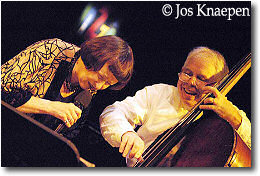 But I always listen to the melody first, as opposed to other singers who listen for the lyrics first. And then I learn it exactly as it's written.
I get somebody who really can play the piano, then I have them come and I work it out, like I'll go to
Steve's house, he's always open. I get together once a week when we're in town with
Cameron (Brown). We're always working on bass and voice ideas. But I always listen to the melody first, as opposed to other singers who listen for the lyrics first. And then I learn it exactly as it's written.
I get somebody who really can play the piano, then I have them come and I work it out, like I'll go to
Steve's house, he's always open. I get together once a week when we're in town with
Cameron (Brown). We're always working on bass and voice ideas.
E.D.:
What about the ideas for your arrangements?
S.J.:
They just come. And a lot of my arrangements I give to other singers. I'll make an arrangement for a song and give it to a singer, and then maybe I'll end up recording it, because it is my arrangement, but I'll say "Take this and try this, it's a little different". Like putting verses on the end and in the middle or whatever… And I have to live with the song for a while. It's always difficult at first, when you first learn a song… the first couple of times you do it, you know, you're not ready yet. It hasn't lived with you yet… You haven't lived with it long enough, yeah…Cause when you have it, the lyrics come like that… you don't even have to worry "Am I singing the right lyrics?"…. They're just there. That's when you really know the tune.
E.S.:
And that's probably when that magic can take place…
S.J.:
Oh yes…I believe so. And I never plan improvisations. I don't just say: O.K. I'm going to do it like this…I'm going to change it here, and then I think I'll change it here… I don't do that. I do it as it happens as long as I have a good lead sheet, good chord changes and I know the tune and I know the lyrics, I know what these lyrics mean, and I know the original melody, I let it happen. I don't plan it or force it.
E.S.:
Probably because you are interacting with your audience… or the musicians…
S.J.:
Mostly with the musicians with me. Like I listen to what everybody's playing. I never lose connection with them at any time. During their solos I'm always listening, because I have become part of this composition. That's very important for singers to know that they should never, ever ever stray away from what's going on in that immediate circle of singer and rhythm section or instrumental section. Never lose direction. They say: "How can you know when to come in when you're trading fours or eighths with the drummer?" Because, I'm listening. I know where the tune is. I know where it started, I know where it goes, I know where it ends. So that's from listening… And not only that! You get inspiration from listening. I mean, somebody might play something that totally blows your mind! And you'll hear: "Oh yeah! I could go with that!" So it's that closeness that you can achieve when you listen. It's very important. But that's how I approach a tune. I learn it exactly as it was written, and I never listen to other singers singing it first. Never. I listen to other singers to be inspired, I like to hear them. But I never go and search out or hear a song and learn a song from hearing…
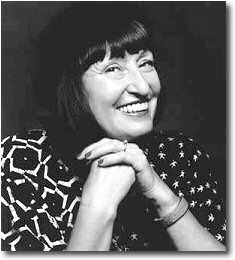 "Oh, I know who sings this! Bla, bla bla… Billie (Holiday) sings this…" I mean, who could sing like Billie, for God's sake! Yeah, Please! Or Sarah Vaughan! Who's got the voice of Sarah Vaughan? Hello!.... I don't think so! And Ella (Fitzgerald)? I mean, no way! "Oh, I know who sings this! Bla, bla bla… Billie (Holiday) sings this…" I mean, who could sing like Billie, for God's sake! Yeah, Please! Or Sarah Vaughan! Who's got the voice of Sarah Vaughan? Hello!.... I don't think so! And Ella (Fitzgerald)? I mean, no way!
E.D.:
You are right… But you too! Nobody sings like you!
S.J.:
Yes, it's unique. Very strange… (she chuckles warmly)
E.D.:
You partly answered to what I wanted to ask you, that is, how did you discover your own personality and since you began a new style, bass and voice, how did you discover this great feeling and why, with the bass?
S.J.:
Oh, that's a good question Eleonora! I discovered my own sound because I knew very young, very early that I could never sound like these great singers. I could never sound like that, and I'm not going to be a poor imitation! I'd rather be the sound that I have. I learned my phrasing and my timing from
Charlie Parker. That's because I was a Charlie Parker freak. I was a bebop freak. I woke up in the morning with the music and I went to bed at night with the music….all day long! I think I dreamt it at night, so we're talking 24 hours non stop. That's one thing. The second thing I heard was one time I was working with
Steve Swallow at this little club, at that time I was studying with Lennie Tristano, and I always heard the bass, and I always wanted in my heart somewhere to be a bass player…. I love the bass. I heard it and I love the wood, I love the sound, and I love the freedom… There's no drums blasting away when they do, you have all of this freedom with the bass, and I just like the way my voice adapted to the bass, and I felt like I was one with that bass… I truly could have a very intimate musical conversation with the bass…And I do! It's wonderful! I love it! I tell anybody who hasn't tried it, they should do it! Absolutely! It's the most incredible way to sing, for me… I don't know about others…. Some people need a lot. Some singers need more melody, some singers need more behind them…But I listen very closely to the bass, and that was the first instrument that I remembered hearing after Bird in the actual rhythm section when Bird was playing. I would hear what
Tommy Potter or Curly Russel would be playing underneath Charlie Parker. Always…
So when I started doing the bass and voice… it was around
1950. I started working with the bass and voice. And then everybody…. of course, as I said, I got all these comments about the bass and voice… And I never started to do it because it was different or: "Oh! Everybody will think this is unique!"
Then I went to Lennie
Tristano…I've studied with him, and I would go to his sessions, and
Peter
(Peter Ind) would be there, and I would say "Can I do something with bass and voice?" and it was like: "Oh! Why do you want to do that when we're all here…." And I said: "I like it!" (she chuckles..) So Lennie said:"So go ahead and do it! Do what you believe in, do what you feel." So it was great! And one of the first times I ever sang in public with bass and voice, and I told the story in Cremona, and there were some bass players there, and they were thrilled… I was in Toledo visiting some relatives, and
Charlie Mingus was there with Lee Konitz
and a drummer. It was Mingus on bass, the drummer and Lee Konitz. There might have been a trumpet player, I don't remember, but I remember Lee. I was in the audience so Mingus said "Hey! Sheila! Why don't you come up and sing something?" and I said: "Where's the piano?" and he said: "Well, that never seems to bother you when you're at sessions!" I said: "Yeah, but that's sessions, you know…" So the first time I ever sang with bass and voice it was with Charlie Mingus! And it was "Yesterdays"… I'll never forget the tune and I'll never forget the key. It was G minor. And that was it! And then I started working at this Club in the Village, and on Monday nights they had a session night and
Steve Swallow was playing. Steve used to come down and play for that session, before he became so popular. And at that time he was playing upright bass, and when it was my turn to sing in the club, I would sing with him. It was great.
 E.D.:
And is it because of that you recorded "Home"?
S.J.:
My first album was "Portrait of Sheila" and my first recording was with
George Russel on "You Are My Sunshine"…
P.S.:
It's very avant-garde…
S.J.:
Oh, it was way ahead of its time!
P.S.:
Still today!
S.J.:
Oh, I know…That was again one of those things… Like George played this arrangement on it and he said: "Ok, sing!" I said: "With what?" And he said: "What! You always sang by yourself when you were a kid! So sing!" So I said: "Oh! O.K.!" (Sheila chuckles, her green eyes gleaming). And I did "Sunshine", but it was written for the coal miners from where I grew up…. You know that story. But anyway that's how I first recorded when I did my Blue Note recording. I was working with
Swallow a lot in this little Club in the village, I wanted it to be a bass and voice, and even Blue Note at the time, as great as those guys were, said: "Well… we don't think…. Maybe we better add…. You could do some, but maybe we better add a little drum in there, and a little guitar".
E.D.:
How did the audience respond to this?… It was new…
S.J.:
I guess it was Ok… Yes, well they respond today now they're …. Very responsive!
P.S.:
But maybe today we are used to this…
S.J.:
Yes, well now you are. But when I was doing it, it was very unique. I used to get standing ovations with it…. Especially when you do a whole hour!
 Or two hours! I mean, that's what we've worked up to. I've got two hours, and actually I could do three hours with bass and voice, repertoir-wise. It's a wonderful way to sing. You know, I was supposed to do a concert several years ago in Emonton, Canada. I had already met
Attilio (Zanchi) there. When I met Attilio this guy in Canada introduced me to Attilio Zanchi, this promoter from Emonton, and then he was the one who suggested that I do this Festival with Attilio. And I said: "We've never worked together"…I mean, bass and voice, I rehearse a year with bass and voice. Attilio was so sweet. He came, we spent like two days in the hotel room just rehearsing the bass and voice, bass and voice! And guess who we opened for? We opened for
Herbie Hancock and Wayne Shorter. So we were the opening act. We got the most unbelievable review. They gave us such a rave review I couldn't believe it! And I didn't know whether the concert was good or bad…It was one of those things like: "I'm here, I feel strong, I feel Ok, I'm just gonna go out and do it!" And that's what happened… But that was an unbelievable review on that bass and voice… and we had never done it before and we've never done it since! See, I'm very true, like I'm married to the bass that I work with unless the bass divorces me, like Or two hours! I mean, that's what we've worked up to. I've got two hours, and actually I could do three hours with bass and voice, repertoir-wise. It's a wonderful way to sing. You know, I was supposed to do a concert several years ago in Emonton, Canada. I had already met
Attilio (Zanchi) there. When I met Attilio this guy in Canada introduced me to Attilio Zanchi, this promoter from Emonton, and then he was the one who suggested that I do this Festival with Attilio. And I said: "We've never worked together"…I mean, bass and voice, I rehearse a year with bass and voice. Attilio was so sweet. He came, we spent like two days in the hotel room just rehearsing the bass and voice, bass and voice! And guess who we opened for? We opened for
Herbie Hancock and Wayne Shorter. So we were the opening act. We got the most unbelievable review. They gave us such a rave review I couldn't believe it! And I didn't know whether the concert was good or bad…It was one of those things like: "I'm here, I feel strong, I feel Ok, I'm just gonna go out and do it!" And that's what happened… But that was an unbelievable review on that bass and voice… and we had never done it before and we've never done it since! See, I'm very true, like I'm married to the bass that I work with unless the bass divorces me, like
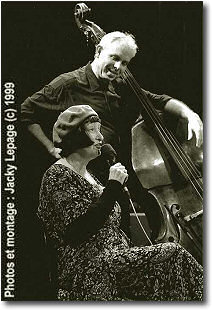 Harvie
(Swartz) and I had a bass and voice for eighteen years, and he divorced my voice.. Harvie
(Swartz) and I had a bass and voice for eighteen years, and he divorced my voice..
E.D.:
Why?
S.J.:
He just didn't want to do it any more… So.. He said it wasn't helping his carreer, he had other directions. I understood that! That's cool… But it was like a marriage! I was devastated! And now I'm with
Cameron, and a lot of bass players say: "Can we do the bass and voice?" And I say… "Well you know…. Not really…. I mean, if Cameron decides to divorce, if his bass decides to divorce my voice, then we will talk about it!" (We all laugh) So, I mean, it really is more like a marriage than a trio… But you know, bass and voice is very special to me! And I know that I'm the pioneer of it. I am the first person to ever do the bass and voice in the World, and that's before
Peggy Lee…
All of us:"Fever"!
S.J.:
Now, that's the only thing she ever did with bass! But I remember when she came out with "Fever", I had been doing the bass and voice for a couple of years! But I wasn't upset! I was very happy because I said: "Well, now look… They've accepted this!" It was a hit! So now I hear it all the time! And the wild thing about it is that I don't think that a lot of the kids that do bass and voice have ever heard me with the bass and voice! They're not aware of the fact how far back it went. And again, going through that growth of acceptance, of having people come in and say: "Where is the drums? Where is the piano?" But generally it's very well accepted and it's a great way to do music. It's great, but you can't have a lot of noise, you can't have whirring lights that make a noise, you can't have fans going making whirring noises, because of the intonation, it goes off very easy. The intonation can slip like that… You always have to be very careful, and the bass always has to keep tuning up, but it's worth it! Worth every minute of it! I'm gonna do another live recording of bass and voice.
E.D.:
You can control your voice and you can use all the nuances of the voice…
S.J.:
Oh, me, I don't ever feel ever that I have to push! There's just a certain part of my range, of sound in my voice that I don't get when I'm singing with a full trio. There is a certain sound that comes out with the bass. And I hear the bass, and I love the bass, and I love the sound. It's wonderful, I love it.
I thank Sheila Jordan for this marvellous interview, and her Milanese girls for the thrilling evening… We are anxiously waiting for her next release and her next visit to Milano!
If you would like to visit her site, here is the address:
www.SheilaJordanJazz.com
Insert a comment
©
2000 - 2004 Eva Simontacchi - Jazzitalia.net - All Rights reserved
|
© 2000 - 2026 All the material published on Jazzitalia is exclusively owned by the author. Moreover it is protected by International Copyright, so it is forbidden any use of it which isn't authorised by the rights' owner.
|
This page has 15.093 hits
Last Modified Date: 31/07/2004

|
|

